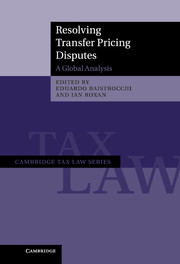Book contents
- Frontmatter
- Contents
- List of figures
- List of tables
- List of contributors
- Acknowledgements
- The Golden Bridge: analytical table of cases by topics in the OECD Guidelines
- Table of Cases
- Abbreviations
- Part I The context of transfer pricing disputes
- Part II North America and Europe
- Part III Asia Pacific
- Part IV BRIC Countries
- Part V South America, Middle East and Africa
- 17 Transfer pricing disputes in Argentina
- 18 Transfer pricing disputes in Chile
- 19 Transfer pricing disputes in Israel
- 20 Transfer pricing disputes in Africa
- Part VI Conclusion
- Index
- References
19 - Transfer pricing disputes in Israel
from Part V - South America, Middle East and Africa
Published online by Cambridge University Press: 05 November 2014
- Frontmatter
- Contents
- List of figures
- List of tables
- List of contributors
- Acknowledgements
- The Golden Bridge: analytical table of cases by topics in the OECD Guidelines
- Table of Cases
- Abbreviations
- Part I The context of transfer pricing disputes
- Part II North America and Europe
- Part III Asia Pacific
- Part IV BRIC Countries
- Part V South America, Middle East and Africa
- 17 Transfer pricing disputes in Argentina
- 18 Transfer pricing disputes in Chile
- 19 Transfer pricing disputes in Israel
- 20 Transfer pricing disputes in Africa
- Part VI Conclusion
- Index
- References
Summary
Introduction: the Israeli tax sphere
Modern Israeli income tax law developed within an archaic British colonial statutory framework. Israel's Income Tax Ordinance (New Version), 1961 (the ‘Ordinance’) originated in an ordinance enacted in 1941 (and later amended in 1947) by the British Mandate government, based on a Model Income Tax Ordinance prepared by the Inter-departmental Committee on Income Tax in the Colonies not Possessing Responsible Government. The Mandatory Tax Ordinance continued to apply after Israel's independence in 1948. In 1960, it was redrafted in Hebrew, without changing the substance. Since then, this ‘new version’ has been the basis for frequent amendments of the Ordinance (195 to date). At the beginning of the twenty-first century, major fiscal reforms resulted in the modernisation of the Ordinance. A residency-based tax system replaced the earlier territorial-based system. New provisions were enacted, addressing participation exemption, taxation of REIT funds, taxation of trusts, transfer pricing for international transactions, a pre-ruling mechanism, CFCs, and more. Tax rates and various capital gains exemptions were frequently updated to attract foreign investment and human capital.
On the international side, as of August 2012, Israel is signatory to fifty-one tax treaties which were ratified and are in effect. In addition, Israel has signed a new tax treaty with Malta, and renewed several old treaties, all of which are yet to be ratified. Most of Israel's treaties are based on the OECD Model Convention, and Israel is now acting to adjust its tax treaties to the revised 2008 OECD Model Convention.
- Type
- Chapter
- Information
- Resolving Transfer Pricing DisputesA Global Analysis, pp. 757 - 789Publisher: Cambridge University PressPrint publication year: 2012



